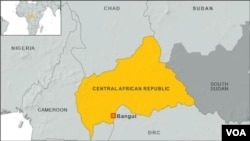Fresh violence in northwest Central African Republic this week has killed
several people and forced thousands from their homes, with many seeking refuge in neighboring Chad and Cameroon, the United Nations said on Friday.
The spate of attacks and reprisals took place in Ngaoundaye, about 500 km (300 miles) northwest of the capital, between groups backed by Christian militias and herders supported by Muslim fighters, said the U.N. peacekeeping mission (MINUSCA).
Several people have been injured and killed in recent days, houses have been burned and looted, and thousands of people have been uprooted, according to the U.N. Office for the Coordination of Humanitarian Affairs (OCHA).
"This new spiral of violence will likely cause additional needs in CAR while the increasing insecurity is rendering the work of humanitarian actors even more challenging," Michel Yao, the country's humanitarian coordinator, said in a statement.
Central African Republic descended into chaos in March 2013 when mainly Muslim Seleka fighters seized power, triggering reprisal attacks by Christian anti-balaka militias.
A fifth of the population fled their homes due to violence and the country remains largely divided along religious lines and controlled by warlords.
More than 400,000 people have been internally displaced, and some half-a-million have fled to neighboring countries such as Chad, Cameroon and the Democratic Republic of Congo, OCHA said.
Aid access in the country is hindered by insecurity and violence, and there were more than a dozen attacks against aid workers last month, according to the U.N. agency.
Medical charity Medecins sans Frontieres (MSF) halted operations in the west of the country last month after a staff member was shot dead during an ambush on one of its convoys.
MSF said more than two-thirds of the country's health facilities have been damaged or destroyed by fighting since 2013, while around 2.3 million people — half of the population — urgently need humanitarian aid, according to OCHA.
President Faustin-Archange Touadéra took office in March after elections aimed at drawing a line under the crisis, and observers hope his election will help end the country's unrest.





